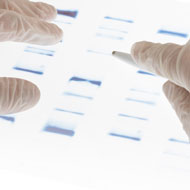New insights into superbug link between humans and animals

By looking at the bacteria’s evolutionary history, researchers found that humans are likely to be the original host for the bacteria. (Stock photo)
Scientists have shed new light on how disease-causing strains of Staphylococcus aureus can jump between humans and animals.
A team led by the Roslin Institute studied the genetic make-up of more than 800 strains of the bacteria, which were isolated from people and animals.
The findings, published in the journal Nature Ecology & Evolution, could help to improve the use of antibiotics and limit the spread of disease.
Antibiotic strains of S aureus, such as MRSA, are a major cause of hospital acquired infections. It is also a serious burden for the agricultural industry, causing diseases such as mastitis in cows and skeletal infections in broiler chickens.
By looking at the bacteria’s evolutionary history, researchers found that humans are likely to be the original host for the bacteria. The first strains capable of infecting livestock emerged around the same time that animals were domesticated for farming.
The study also revealed that cows were a source of strains that now cause infections in humans worldwide, which underlines the importance of disease surveillance in humans and animals, in order to spot strains that could cause major epidemics.
Furthermore, each time the bacteria jumps species, it acquires new genes that allow it to survive in the new host. In some cases, these genes can also confer resistance to commonly used antibiotics.
Researchers also found that the genes linked to antibiotic resistance are unevenly distributed among strains that infect humans, compared to those that infect animals. They believe this reflects the different practices linked with antibiotic usage in medicine and agriculture.
Professor Ross Fitzgerald, group leader at the Roslin Institute, commented: “Our findings provide a framework to understand how some bacteria can cause disease in both humans and animals and could ultimately reveal novel therapeutic targets.”



 The Responsible Use of Medicines Alliance - Companion Animal and Equine (RUMA - CA&E) has launched a survey which seeks to measure the success of this year's Antibiotic Amnesty campaign.
The Responsible Use of Medicines Alliance - Companion Animal and Equine (RUMA - CA&E) has launched a survey which seeks to measure the success of this year's Antibiotic Amnesty campaign.